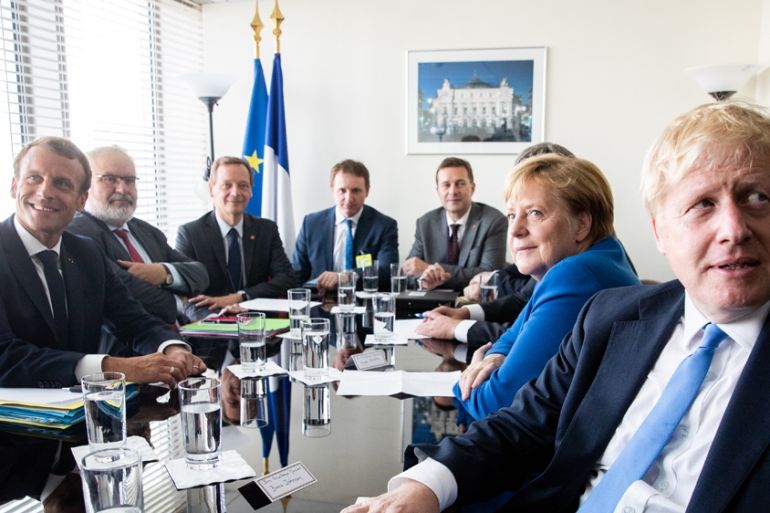Is Europe shifting towards the US on Iran?
EU blames Iran for attacks on Saudi oil facilities, backs US call for talks on nuclear and regional security issues.

The September 14 attacks on Saudi Arabia‘s oil industry have ratcheted up tensions in a region already on edge from an escalating standoff between the United States and Iran.
The attacks, which knocked out five percent of the world’s crude supply, were claimed by Yemen‘s Houthi rebels. But US Secretary of State Mike Pompeo swiftly blamed Iran, and President Donald Trump hinted at military action saying his country’s military was “locked and loaded”.
Keep reading
list of 4 itemsGeorgia’s ‘foreign agents’ bill: What’s the controversy about? What’s next?
What’s at stake in next month’s European elections?
EU to drop rule-of-law dispute with Poland
Iranian President Hassan Rouhani rejected any involvement, while his top diplomat warned Tehran was ready for “all-out-war” in the event of a US or Saudi attack against Iran.
The fallout scuppered fragile hopes of a meeting between Trump and Rouhani at the United Nations General Assembly (UNGA) in New York this week. Many had hoped direct talks could ease the frictions triggered by Trump’s decision last year to abandon a multi-lateral accord that curbed Iran’s nuclear programme and to reimpose punishing sanctions against Tehran.
The political reverberations from the attacks are even more far-reaching.
|
|
On Monday, the United Kingdom, France and Germany – the European signatories to the 2015 nuclear deal who have for months been trying to save the unravelling accord – backed Washington’s assessment and held Iran responsible for the attacks on Saudi Arabia’s Abqaiq and Khurais oil facilities.
The three nations also appeared to back the US demands for a new accord that also addressed Tehran’s support for regional armed groups as well as its ballistic missile programme.
“The time has come for Iran to accept negotiation on a long-term framework for its nuclear programme as well as on issues related to regional security, including its missiles programme and other means of delivery,” they said.
The joint statement marked a significant change in European policy on Iran, analysts have said.
“Europe’s shift towards the White House’s position … will further dim the prospects for EU of enabling Tehran to circumvent US-imposed sanctions,” said Giorgio Cafiero, CEO of the US-based Gulf State Analytics.
“The White House will interpret Europe’s shift as a sign of ‘maximum pressure’ working while the Islamic Republic will see it as yet the latest sign of the extent to which Europeans lack the political and geo-economic leverage to truly break from the US on the most important Iran-related issues,” he added.
‘Maximum resistance’
Iran has responded to the US’s move by beginning to scale back its commitments under the nuclear deal, warning it, too, will abandon the accord if European countries failed to deliver on the economic front by producing concrete steps to help counter the effect of US sanctions.
The UK, France and Germany, along with the European Union, have continued to back the deal, which was also signed by Russia and China. But the European efforts to ease the economic pressure on Tehran, including the launch of a barter-based trade channel called INSTEX to bypass US sanctions, have yet to yield any results.
On Thursday, the UN nuclear watchdog confirmed that Iran has deployed advanced centrifuges for uranium enrichment – its third step away from the deal. Tehran has said the measures are reversible, but its latest move prompted an EU warning that it may be forced to start withdrawing from the accord, The Guardian newspaper reported.
Patricia M Lewis, research director for international security at the UK-based Chatham House, said Iran’s decision to scale back its commitments was undermining the EU’s approach on saving the nuclear deal.
“The strategy was to put funding and protection mechanisms in place, encourage the US to engage with Iran and the EU, and wait out the Trump administration,” she said.
Lewis added that because Iran had also chosen “to not comply with some aspects of the deal … the EU has to admonish Iran and perhaps more severely than it does the US as Tehran is actively producing more nuclear material.”
“This situation of course allows the Trump administration to say ‘we told you so … ‘, thus playing into the hands of those in Europe who were always more sceptical of Iran’s continued commitment to the deal.”
The apparent shift in the EU’s position elicited a harsh reaction from Iranian officials.
Supreme Leader Ayatollah Ali Khamenei lashed out at “vicious” European powers in a September 26 address, demanding that Iranian diplomats “categorically abandon any hope and trust in them”.
“Europeans’ motives for enmity with the Islamic Republic are not different in principle from US hostility” even though they “pretend to act as a mediator” between the two adversaries, he said.
Despite the widening political rift between Iran and the EU, analysts said Tehran was unlikely to make compromises and return to full compliance with the nuclear deal, known formally as the Joint Comprehensive Plan of Action (JCPOA) partly to avoid conveying an impression of weakness and submission. On the contrary, Tehran would continue its policy of “maximum resistance” against pressure and move towards restoring its nuclear programme to full capacity.
“The Islamic Republic’s general counterstrategy is to revive the nuclear issue, which the JCPOA had almost resolved as a security threat, and turn it into a new security predicament for the West,” said Saheb Sadeghi, managing director of the Tehran-based magazine Diplomat.
“In the event of a European-American consensus on Iran, Iranian countermeasures will be further radicalized, so much so that Tehran might even take the final steps towards exiting the nuclear accord faster and earlier” than expected, he said.
“In the current circumstances, where adherence to the JCPOA does not yield any economic benefits, Iran’s final objective is restoration of its full nuclear potential.”